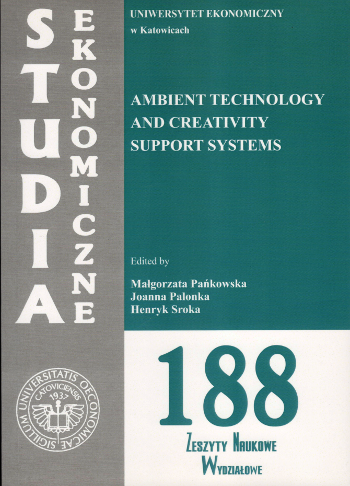
Publisher: University of Economics in Katowice (2014)
306 pages
ISSN 2083-8611
Ambient technology and Creativity Support Systems
Studia Ekonomiczne Zeszyty Naukowe 188
Malgorzata Pankowska, Joanna Palonka, Henryk Sroka (eds.)
The continuous evolution of hardware, software and communications technology is rapidly transforming the business world into the world of ambient technology. This next wave of information technology is fundamentally different in that it makes distributed wired and wireless computing and communication disappear to the background and puts users to the foreground. Ambient technology adapts to people instead of the other way around. Ambient technology concerns the consumer electronics, telecommunications and computing that was originally developed in the late 1990s. Nowadays, in the ambient technology world, devices support people in carrying out their everyday life activities as well as encourage them to be more creative in their using information and intelligence. The creative activities always involve change, new ideas, innovation and a certain discomfort of lack of stability. Generally, a certain amount of motivation is needed to make people operate actively. Creative practitioners are strategic thinkers, planning and making choices and evaluating and positioning themselves and their work according to a range of external and internal parameters. Organizational creativity can be stimulated, if the business unit is managed in such a way that employees are encouraged to generate and implement ideas for the overall good of the organization. The business organization managing the creativity should tolerate diversity, complexity and contradiction.
Taking into account the discussion above, the research articles included in this book use the terms ambient technology and creativity to refer to an individual or a community of individuals that realize their business supported by ICT in their operational environments.
The aim of this book is to improve our understanding of creativity support system environments. The various research articles analyse creative and innovative activities in the case studies or just through provision of academic discussions. The book is likely to be of interest to students and scholars in a number of research fields as well as to business policy decision makers concerned with research, teaching and policy measures for the development of ambient technology and creativity support system environments.
![Send mail [Send mail]](mailto.gif)

![Homepage [Home]](back.gif)